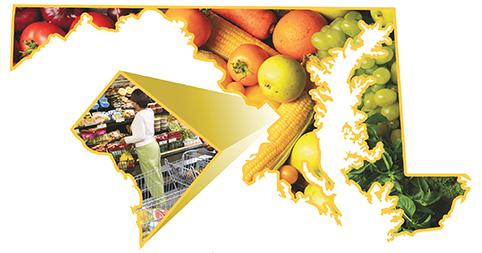Population diversity, too, continues to feed Maryland’s produce appetite. “There has been a shift in demographics, especially among Latinos and Asians,” observes the Maryland Food Authority’s Harrell, which in turn has been good for fresh fruit and vegetable demand. The most recent census figures put Maryland’s combined Asian and Latino population at 13.7 percent, up from 8.3 percent a decade earlier. Though the pace has slowed somewhat, other groups including European immigrants have continued to climb, doubling in the last 10 years.
Food Safety
Maryland produce shippers and wholesalers are keeping food safety top of mind. “Food safety is the first thing our employees are trained on. To this day, we have not had an issue with food safety contamination,” says Moderacki.
Most of the region’s wholesalers are taking the Food Safety Modernization Act (FSMA) implementation in stride, though some have adopted a wait-and-see approach. “We’re always concerned about food safety,” notes Vitrano. “We’re just waiting to see how things trickle down to the wholesale level.”
Some fear future FSMA impacts could reflect what they’re already seeing. “The biggest problem I see is that the USDA does not have adequate staffing on the import side,” remarks Class. “Delays seem to be getting worse and it is hurting business.”
Choptank’s Covey says FSMA will impact all produce companies. “Ultimately, what FSMA is going to usher in is shared accountability between shipper and driver,” he notes. Technology will be a key part, with various tools available for drivers to monitor trailer temperature fluctuations and prevent trouble loads.
Maryland Ag Secretary Bartenfelder hopes FSMA regulations requiring state oversight will be accompanied by funding. “There is still much work to be done to assist farmers, especially those in the $25,000 to $500,000 category, with the necessary technical knowledge and expense of implementing new practices,” he says. “What is lacking in the FSMA process are the additional resources states like Maryland will need to fully implement this program to address public health concerns and the continued success of our farmers.”
Moderacki expresses a sentiment many in the industry espouse: “Food safety is an integral part of our operation. The only thing that concerns me is that the government doesn’t go too far.”
Although food safety, fuel prices, and weather will always affect the fresh produce market throughout the Eastern Seaboard and the rest of the United States, Maryland’s future seems a bit more insulated than other regions. The state not only produces a wide selection of in-demand fruits and vegetables, heavily promoted by the Maryland’s Best marketing program, but its consumer base continues to expand.



